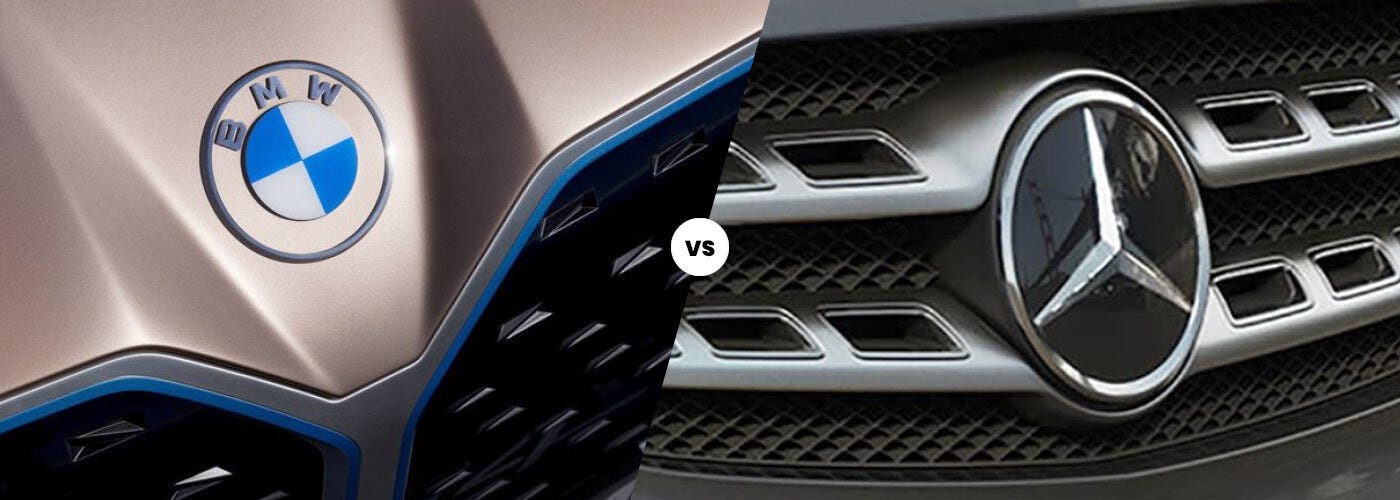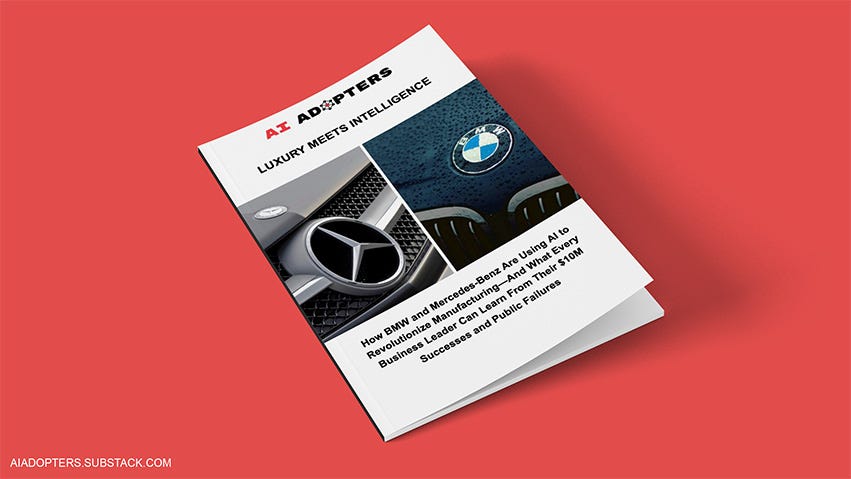When Luxury Cars Meet AI: BMW vs. Mercedes-Benz
Hey Adopter,
Remember when the most advanced technology in a car was power windows? Those were simpler times. Now your vehicle analyzes your driving habits, talks to you like a slightly dimwitted personal assistant, and will soon be able to drive itself while you catch up on TikTok. The future is... something.
Today I'm breaking down how two German luxury giants, BMW and Mercedes-Benz, are implementing AI and robotics in their businesses. And no, this isn't just car talk for gearheads. It's a master class in how traditional companies with decades of history are navigating the same AI transformation challenges you're facing.
The Robots vs. Humans Saga
First, let's acknowledge the elephant in the factory: both BMW and Mercedes tried going full "robot revolution" in the past, and both had to awkwardly backpedal.
In 2016, Mercedes famously replaced robots with humans for producing the S-Class because, in their words, "robots can't deal with the degree of individualization" customers wanted. Translation: even multi-million dollar robots couldn't handle Karen's request for custom purple cupholders.
Meanwhile, BMW's production chief stated flat out: "to fully automate the assembly process is not our goal, because the human being...is unbeatably flexible." This coming from an engineering company that would automate breathing if they could figure out how.
The AI Arms Race in Action
BMW's AI Approach:
Predictive maintenance AI that saved 500+ minutes of downtime yearly at just one plant
Smart logistics robots that delivered over $10 million in operational cost savings
Testing humanoid robots (Figure 02) for factory work that's awkward or strenuous for humans
Digital twin technology with NVIDIA to simulate production scenarios before implementation
Mercedes-Benz's AI Approach:
Deployed MO360 digital platform connecting ~30 plants globally for real-time quality monitoring
First automaker to integrate ChatGPT into vehicles and achieve Level 3 self-driving certification
Launched Factory 56, a high-tech facility that's 25% more energy-efficient than previous plants
Partnering with Apptronik to test "Apollo" humanoid robots for logistics and material handling
The Secret Sauce (That Won't Be On Any Press Release)
What's really interesting isn't the tech itself—it's the philosophy behind implementation. Here's what these luxury carmakers know that most companies miss:
Human-centric automation is winning. Both companies learned—sometimes painfully—that technology should augment human capabilities, not replace them. They're not using AI to eliminate workers; they're using it to handle boring, dangerous, or physically taxing tasks.
Start small, scale fast. Neither company rolled out AI across their global operations overnight. They run carefully monitored pilots, measure outcomes rigorously, and scale only what delivers real value.
Balance innovation with process control. When Tesla tried to automate everything in Model 3 production, they created what Elon Musk called "production hell." BMW and Mercedes maintain quality by being methodical about which processes they automate and how.
Practical Takeaways for Non-Billionaires
If you're running a business without a multi-billion euro R&D budget, here's what matters:
Identify high-ROI automation first. Both automakers focus on areas like quality control and predictive maintenance that deliver measurable returns. Start where the pain points cost you the most money.
Upskill, don't replace. Train your team to work with AI rather than planning to replace them. Both BMW and Mercedes view their workforce as partners in automation, not obstacles to it.
Balance short-term wins with long-term vision. Mercedes is betting big on consumer-facing AI like ChatGPT in cars, while BMW focuses more on manufacturing efficiency. Your company needs both quick wins and strategic bets.
Learn from failure. Both companies had automation missteps but used those lessons to improve their approach. Document what doesn't work as carefully as what does.
Why Download the Full Report
The attached 30-page research report goes far deeper than this newsletter with:
Detailed ROI Analysis - Actual numbers on cost savings and efficiency gains for specific AI implementations
Competitive Benchmarking - How BMW and Mercedes stack up against Tesla, Toyota, and Hyundai
Implementation Roadmaps - Step-by-step guidance on how these companies rolled out their most successful AI initiatives
Future Technology Trends - What's coming next in automotive AI that will impact all industries
Expert Commentary - Insights from industry leaders and academics on best practices
For the rest of you who just needed the highlights before your next meeting where everyone pretends to understand AI, you're welcome.










